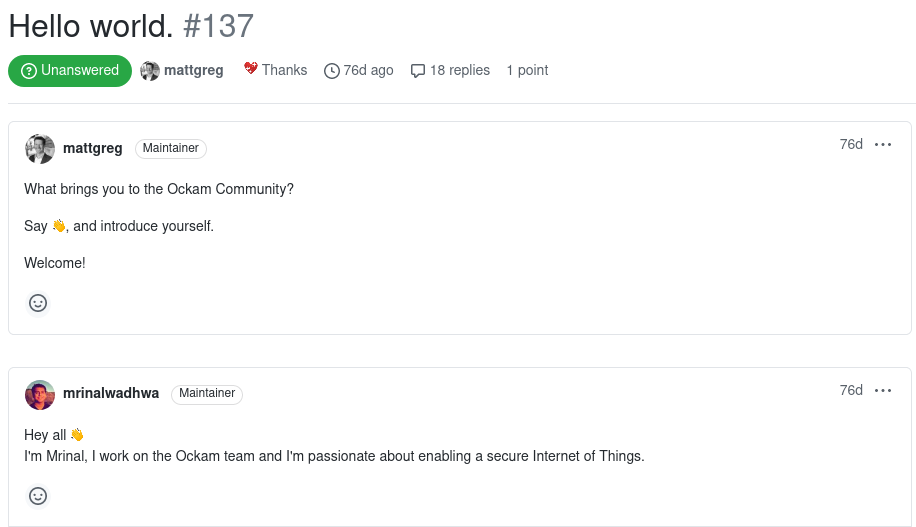Where Should Open Source Communities Chat?
Luke Russell
Published 2020-08-04
Open source projects are the building blocks of the technologies developers use today. These projects are made possible because people come together to collaboratively work on them. With contributors from all over the globe, individuals must have a way to communicate with each other. Discussions are an important part of making any open source project into a community.
The people at Ockam are fans of open source and you should be too. The best way to support open source projects is to be actively involved in their communities. In this article, we'll go over what communities can provide, and the places communities can come together to push their projects forward.
The Importance of Community
Not all open source contributions are code. The goal of an open source project is to build something with the help of other technologies and people. The most productive open source projects are developed and maintained by robust communities. After all, the more people working on the project, the more fleshed out it will ideally become. That applies equally to ideas and code.
But how do you get those people involved? You’ll need a place for individuals working on the project to congregate and share what they’re doing, so other people can notice what’s happening. You want to encourage diverse voices, which will lead to better decisions for the entire community.
Imagine an open source project without discussion. Code additions and deletions would come through pull requests without any context. It would be chaotic. All those extra hands are only as effective as they are organized with one another. Community brings organization and discussion brings community.
To steward a project, you need to provide a place for your community to gather.
Why Ockam Chose GitHub Discussions
There are many ways to organize open source discussions. It makes sense to keep the conversation close to the code. For many open source projects, this means GitHub, which provides a number of collaboration tools. In particular, GitHub Discussions is the latest addition. Ockam was part of this feature’s beta testing group and they were convinced it’s the best place to focus their community’s most important conversations.
GitHub Discussions gives users within an organization the ability to chat in the same place their code lies.
From just saying hi to gathering feedback on a potential project direction, a community can use GitHub Discussions to meet around topics that surround the code.
There are other places within GitHub that still make sense for conversation. However, they can be directed in context:
- Pull Requests: discuss details within the code of a specific contribution
- Issues: keep conversation focused on a singular problem, not a broader topic
There are certainly times when open source projects have stretched the use cases of these GitHub features. That’s why Ockam chose to use GitHub Discussions as the primary place for their community to congregate. It’s a good fit for many other open source communities, as well.
That said, it doesn’t fit every type of conversation for every community. You might also want to look for real-time options, as well as meet your community where they are already having discussions.
Real-time and Open Dialogue: Twitter, Slack, and More
As there are so many communication platforms these days, it can be hard to decide on which ones to use. In some cases, conversations are already happening, so it’s a matter of making sure community leaders are listening. In other cases, a community might want a different experience that feels less formal. Real-time chat and social networks are both options to consider for your community.
Starting a new forum discussion can be a big hurdle for anyone, but especially for someone new to a community. The perceived need for an extremely well-thought and serious message can keep someone from posting. This is especially true if someone thinks they have a “dumb question.” For a community to truly thrive, however, there should be outlets for the sometimes more casual real-time chats that contributors participate in on a day-to-day basis. Think about where you want to direct people for these types of messages.
Of course, they may already be happening. For an extremely casual open forum, Twitter is by far the biggest name. Tweets might be too short for a serious proposal debate, but it’s great for the smaller conversations. Also, if a discussion naturally begins on Twitter, the community can always transition it to a more permanent place.
It’s important to listen on Twitter and other public forums like StackOverflow. You can point your community to one of those, or create your own real-time destination. A few platforms to consider:
- Slack: The chat client of the workplace, Slack has become popular with developer communities, likely because many already have the app installed.
- IRC: The staple of many open source projects. Freenode is an IRC network specifically for open source.
- Discord: A growing messaging platform used by developer communities that includes text, audio, and video chat options.
Ultimately, real-time and social chat may be a decision left to your community. You’ll need leaders and contributors to listen for questions. You’ll want everyone engaged in the conversation and encouraging contributions.
Regardless of how you communicate around your open source projects, find communities that help you work on what you’re most passionate about. If that happens to be making the internet more secure, then check out Ockam's open source community!
Previous Article
Public Key Encryption Explained
Next Article
What are Cryptographic Keys?
